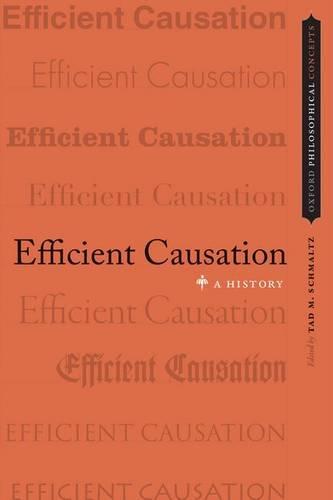Overview
Causation is now commonly supposed to involve a succession that instantiates some law-like regularity. Efficient Causation: A History examines how our modern notion developed from a very different understanding of efficient causation. This volume begins with Aristotle's initial conception of efficient causation, and then considers the transformations and reconsiderations of this conception in late antiquity, medieval and modern philosophy, ending with contemporary accounts of causation. It includes four short ""Reflections"" that explore the significance of the concept for literature, the history of music, the history of science, and contemporary art theory.
Full Product Details
Author: Tad M. Schmaltz (Professor of Philosophy and James B. and Grace J. Nelson Fellow, Professor of Philosophy and James B. and Grace J. Nelson Fellow, University of Michigan, Ann Arbor)
Publisher: Oxford University Press Inc
Imprint: Oxford University Press Inc
Dimensions:
Width: 21.80cm
, Height: 2.80cm
, Length: 14.50cm
Weight: 0.649kg
ISBN: 9780199782185
ISBN 10: 0199782180
Pages: 392
Publication Date: 13 November 2014
Audience:
College/higher education
,
Professional and scholarly
,
Tertiary & Higher Education
,
Professional & Vocational
Format: Hardback
Publisher's Status: Active
Availability: To order 
Stock availability from the supplier is unknown. We will order it for you and ship this item to you once it is received by us.
Table of Contents
Introduction Tad M. Schmaltz Part I Ancient and Medieval 1. Aristotle and the Discovery of Efficient Causation, Thomas M. Tuozzo Reflection: Representations of Efficient Causation in the Iliad, Tobias Myers 2. Efficient Causation in the Stoic Tradition, R. J. Hankinson 3. Efficient Causation in Late Antiquity and the Earlier Medieval Era, Ian Wilks 4. Efficient Causation: From Ibn Sina to Ockham, Kara Richardson Reflection: Efficient Causation and Musical Inspiration, Anna Harwell Celenza Part II Modern 5. Efficient Causation: From Suárez to Descartes, Tad M. Schmaltz 6. Efficient Causation in Spinoza and Leibniz, Martin Lin Reflection: Reason, Calculating Machines and Efficient Causation, Matthew L. Jones 7. Efficient Causation in Malebranche and Berkeley, Lisa Downing 8. Efficient Causation in Hume, P. J. E. Kail 9. Efficient Causation in Kant, Eric Watkins Part III Contemporary 10. Contemporary Efficient Causation: Humean Themes, Douglas Ehring Reflection:Efficient Causation in Art, Tina Rivers Ryan 11. Contemporary Efficient Causation: Aristotelian Themes, Stephen Mumford Bibliography Pre-20th-Century Sources 20th- and 21st-Century Literature Index
Reviews
This fine history of the evolution of conceptions of causation has no rival. ... Contributors' reflections on the interactive development of philosophical conceptions of the concept of efficient causation make this a complex but rewarding work for advanced students of philosophy. Comprehensive index and bibliography ... Summing Up: Highly recommended. Upper-level undergraduates and above. Choice [E]ach contributor provides an expert treatment of a chapter in the history of efficient causation, and the book as a whole gives a useful framework to reflect historically on a key philosophical concept. Andrea Falcon, Journal of the History of Philosophy Does the volume achieve these big-picture goals? Yes, for the most part. The quality of the scholarship is very high without being unapproachable, the volume lays out a detailed and insightful history of its target concept, and the Reflections are engaging and thought provoking...volume succeeds admirably in its stated goals ... Efficient Causation is a history of causation written for metaphysicians. By those lights, it is excellent. Notre Dame Philosophical Reviews Online
Does the volume achieve these big-picture goals? Yes, for the most part. The quality of the scholarship is very high without being unapproachable, the volume lays out a detailed and insightful history of its target concept, and the Reflections are engaging and thought provoking...volume succeeds admirably in its stated goals...Efficient Causation is a history of causation written for metaphysicians. By those lights, it is excellent. --Notre Dame Philosophical Reviews Online
[E]ach contributor provides an expert treatment of a chapter in the history of efficient causation, and the book as a whole gives a useful framework to reflect historically on a key philosophical concept. --Journal of the History of Philosophy This fine history of the evolution of conceptions of causation has no rival... Contributors' reflections on the interactive development of philosophical conceptions of the concept of efficient causation make this a complex but rewarding work for advanced students of philosophy. Comprehensive index and bibliography... Summing Up: Highly recommended. Upper-level undergraduates and above. --Choice Does the volume achieve these big-picture goals? Yes, for the most part. The quality of the scholarship is very high without being unapproachable, the volume lays out a detailed and insightful history of its target concept, and the Reflections are engaging and thought provoking...volume succeeds admirably in its stated goals...Efficient Causation is a history of causation written for metaphysicians. By those lights, it is excellent. --Notre Dame Philosophical Reviews Online The volume showcases crucial elements that at one point or another entered into philosophical views of efficient causation. It provides a useful framework for taking a fresh look at existing work on causation...This Oxford Philosophical Concepts anthology represents a great first step toward a better, historically situated, understanding of efficient causation. As such it is a welcome addition to the philosophical literature. -- American Catholic Philosophical Quarterly
Author Information
Tad M. Schmaltz is Professor of Philosophy and James B. and Grace J. Nelson Fellow at the University of Michigan, Ann Arbor. He has published articles and book chapters on various topics in early modern philosophy, and is the author of Malebranche's Theory of the Soul (Oxford, 1996), Radical Cartesianism (Cambridge, 2002), and Descartes on Causation (Oxford, 2008).
Tab Content 6
Author Website:
Customer Reviews
Recent Reviews
No review item found!
Add your own review!
Countries Available
All regions
|




